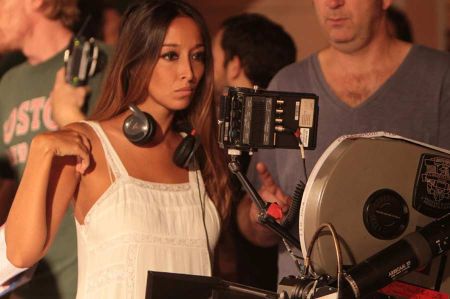The world behind the veil - Saphia Azzedine
- Written by Portal Editor
French-Moroccan Saphia Azzeddine presents a disturbing story of emancipation: from country shepherd to whore.
Saphia Azzedine makes a clear statement to her readers and lets her heroine Jbara say the following words right at the beginning of the novel "Angry Prayers": "You don't even have to say 'bah!'. I won't put poetry where there isn't any poetry.” And there's certainly no poetry in the opening of this disturbing developmental novel: Jbara is sixteen and being shagged. From behind. From the shepherd Milioud. He stinks. But because Jbara also stinks, it balances out in the end. Milioud grunts like a pig and fucks "like a camel, balls sweating." The misery stinks of ass. "And Milioud's ass never saw water". In a dirty plastic bag, Milioud always leaves a pomegranate yoghurt and some chocolate chip cookies for Jbara. For them "maximum enjoyment". Readers can also be captivated in this straightforward and hard way.
The father constantly listens to the words of the "fkih"

The father constantly listens to the words of the "fkih", the clergyman in the neighbouring settlement, the "biggest idiot in the village". Who lives at the "expense of the poor and ignorant." Who keeps preaching that the greatest sin of all young women is not being a virgin. Unfortunately for Jbara, Milioud got her pregnant. Her father rejects her and chases her out of the village. Lucky for Jbara, a pink trolley case with "J'taime d'Dior" printed on it falls out of a passing bus. Inside is a wad of money and a set of daring underwear that will show the future of the beautiful shepherd girl.
She leaves for the city and initially works as a kitchen hand. She pays for a small room above the filthy restaurant with evening blowjobs. She gives birth to her child in the dust of the street and leaves it behind. A pain and misery "to the point of no longer". Then the next job. A small step up as a maid in a rich family.
There she is regularly raped by the master of the house, Sidi. "I don't know what to do, crying is so old-fashioned." But Jbara doesn't break here either, she keeps her inner freedom. And when Sidi, on a whim, shows her own lust, she makes a decision: she becomes a prostitute, dances in a posh nightclub, earns so much that she placates her father with a television in front of the poor woman family spends monotonous hours. The goatskin tent gets a satellite dish, while Jbara becomes the beautiful "Scheherazade", the playmate of a rich sheikh, who indulges his sexual desires and perversions on her. A high price that the shepherd girl pays on her way to the prostitute.
She was best known as an actress and screenwriter
During all this time, Jbara has one confidante: Allah. She talks to him all the time and sometimes prays to him. Sometimes she complains too. Sometimes she's angry, sometimes grateful. Often upset. But she never blames him for her fate. Sometimes she also asks him and begs for understanding: “Can one escape one's fate? Does a girl like me even have a destiny? Can you seriously blame me for preferring a roof over your head to the street, a little warmth to the cold, and a bed to the curb?”
Anyone who writes such a drastic book in such angry language would do well to distance themselves from the literary self. Saphia Azzeddine, born in Agadir in 1979, emphasizes in interviews that she herself grew up in a “sheltered” way. At the age of nine she came to France with her family, where she later studied sociology. She was primarily known as an actress and screenwriter before she presented her novel debut in 2008 with "Zornpraete". Three more novels have since followed by the attractive author, who critics and fans call the "modern Scheherazade". In Germany, she first attracted attention as a director in 2011, when she filmed her second novel, "My father is a cleaning lady".
With "Angry Prayers" Azzeddine has succeeded in writing a very idiosyncratic story of emancipation from the world beyond the veil. Jbara's disturbing directness, her sometimes vulgar language, the breaking of taboos with which she takes Allah to court, do not hide the fact that this idiosyncratic young woman makes decisions without mockery. And bear the consequences of it. Until she finally finds her inner peace.
Nevfel Cumart
Saphia Azzeddine: Anger Prayers. Novel. Wagenbach Verlag, Berlin. 121 pages, 16.90 euros.
Saphia Azzeddine
Saphia Azzeddine later studied sociology and published her first novel in French at the age of 29, which was translated into German five years later. Today Saphia Azzedine lives in Geneva and works there as a journalist.
publications
2008: Confidence to Allah. Editions Leo Scheer, Paris, ISBN 978-2-7561-0119-4.
2013: German: Anger prayers. translated by Sabine Heymann. Wagenbach, Berlin, ISBN 978-3-8031-3248-2.
2009: Mon père est femme de ménage. Editions Leo Scheer, Paris, ISBN 978-2-7561-0195-8.
2010: La Mecque-Phuket. Editions Leo Scheer, Paris, ISBN 978-2-7561-0263-4.
2011: Heroes anonymous. Editions Leo Scheer, Paris, ISBN 978-2-7561-0337-2.
2013: Combien veux-tu m'épouser? Grasset, Paris, ISBN 978-2-246-80437-6.
movies as an actress
2010: Fasting in Italian (L'Italy) by Olivier Baroux.
as a producer and director
2011: Mon père est femme de ménage. The film received the Prix du public Europe I at the Festival international du film de comédie de l'Alpe d'Huez in 2011.
